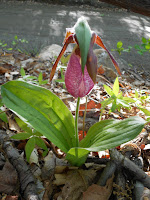
Lady Slippers are so special that when discovered it is like
finding a treasure.
Wildflower lovers
will keep their location secret, in fear that those who don’t understand their complexity
will pick them or dig them up.
Both
spell disaster to the plant.
Just to
germinate, they require acidic soil that contains a fungus of the Rhizoctonia
genus.
Like most orchids, their seeds do
not contain a food supply.
Under the
right conditions, the fungus will crack the seed and attach itself.
It will pass along nutrients to promote
germination and growth.
Once the plant is
established and producing its own nutrients, the fungus will extract food
from the slipper’s roots.
In this way,
both benefit from their relationship.
Lady Slippers take years to reach the flowering stage and bees are its
sole pollinator.
Attracted by color and
scent, the bee enters through the front slit into a one-way labyrinth that
contains no nectar.
Near the exit, hairs
will grab onto any pollen the bee may be carrying before depositing new pollen
onto its back.
Such an elaborate system
leads to very few flowers being pollinated.
However, a pollinated flower can produce 60,000 seeds.
In that a Lady Slipper’s average life span is
20 years with some living much longer, they have a long time to successfully produce
one pollinated flower.
(Photo: Donna Roscoe)
No comments:
Post a Comment